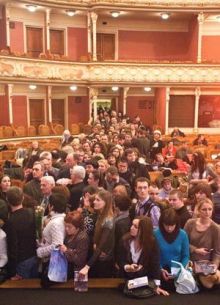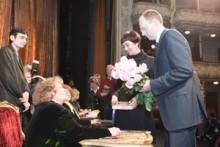On January 31 the Kyiv Ivan Franko Theater hosted many prominent Ukrainians: writers, musicians, film directors, art critics and intellectuals. These were people we should see more of, and who know and feel Ukrainian literature, history, and Ukraine’s present day. “A reading of Lina Kostenko, as part of the presentation of the novel Zapysky ukrainskoho samashedshoho (Notes of a Ukrainian Madman; publishing house A-BA-BA-HA-LA-MA-HA),” invitations stated. But in fact neither the word “reading” nor “presentation” were appropriate for this event. Everyone who chanced to get to the theater that evening was fully aware of this. The atmosphere was dense and intense as never before. Actually, any meeting with Kostenko is not merely a literary event, but also a social and cultural one. A similar effect could be witnessed in March last year when the Ukrainian Home was overcrowded by people who came to congratulate Kostenko on her 80th anniversary and another edition of the novel Berestechko (publishing house Lybid). Those who came to the Rivne Music and Drama Theater last week must have felt the same, Lina Kostenko started her national book tour there. Those who didn’t manage to get inside the theater and watched the performance via a screen, though it was 10 degrees outside, felt the moment even stronger. Naturally, the Kyivites had to repeat this exploit, and the Ivan Franko Theater couldn’t accommodate all the people wishing to see and hear Kostenko either. Should the organizers rent stadiums? The presentation of the first prose novel by Kostenko really deserves thousands of Ukrainians to watch it. Mass media, live broadcasts, channels financed by the state budget exist for this. While national channels broadcasts low quality products, Ukrainians thirsty for high culture have to freeze.
In the twenty-year gap in national cultural, informed and socially aware Ukrainians, Kostenko says, already miss themselves. Hence the crowds in front of the theater, the long lines for autographs, and the 45,000 copies of Notes... already sold.
Already on February 2, yet another book by Kostenko was presented in Ukrinform. This time it was the poetic Richka Heraclita (Heraclitus’ River; publishing house Lybid). Ivan Malkovych said that the writer was finishing her work on a novel about the Chornobyl zone and the second, “female” part of Notes.... A book of recollections Dyvny sad Ivashkevycha (Strange Garden of Ivashkevych) will also appear soon. A two-volume edition of poetic works is planned as well.
“The volcano awoke,” Ivan Malkovych commented on this impressive list of Lina Kostenko’s creative plans.
“The volcano wasn’t dormant,” Lina Kostenko corrected the publisher after appearing on stage.
The audience stood up.
“The book became an event right away,” Ivan Malkovych said about Notes.... “It sold out immediately in bookstores, we ran out of invitations for readings by Lina Kostenko. Wonderful people come to these meetings.”
There were some politicians among the “wonderful people”: Yulia Tymoshenko, Arsenii Yatseniuk, Viacheslav Kyrylenko, but, what is notable, no government representatives. There is a different mainstream now, and it doesn’t require additional attention in its disgracefulness. And, after all, the point is not in putting to shame once again those who don’t have shame or conscience, but in being different yourself. And those efforts directed to being different should unite Ukrainians.
“When I agreed to the presentations, I thought they would take place in some bookstores, libraries, small buildings. I didn’t expect these would be theaters, big halls,” Kostenko confessed. “I didn’t appear for such a long time, and my absence gave you a possibility to forget me, forget about my existence altogether. However, I am very thankful to you. People miss themselves, miss this atmosphere. As in the 1960s. People came to listen to those people of the sixties, few of them are still live, their poetry, they needed it very much. Obviously, people missed unsubstituted words. Because today politicians appeal for unity, patriots appeal for unity, but there is no unity. However, in such audiences I see unity. Obviously, there is a better unity with culture and literature. These meetings with people in big halls showed me that we have everything, they shouldn’t say that we don’t have literature, readers, culture, elites, language. That we don’t have any opposition. Do you know that we are the opposition? Recently on television one deputy, known for being a one-handed conductor, said that ‘the government wished there were an opposition, but there is none, and it’s very difficult to work without an opposition.’ So the government shouldn’t worry, there is an opposition. And it is the people. We are a noble opposition. We share common human values. Our opposition lies exactly in this. Civic society is being born from our beautiful peaceful opposition,” Kostenko pointed out.
During the evening not only words were important. We asked the wife of Germany’s ambassador to Ukraine Elizabeth Heimsoeth about her impressions. She almost doesn’t understand Ukrainian, which is why her thoughts are especially interesting.
“I am simply astounded. This is not only poetry, not only literature, but something much more — this is the soul of Ukraine! We saw and heard Lina Kostenko for the first time, but, undoubtedly, this is a unique person,” she told The Day.
Right after Kostenko’s presentation almost the whole theater stood in line for autographs. Someone even authoritatively pointed out that last time he saw such a line it was near the Salvador Dali Museum when the artist was one hundred years old. While the queue for Kostenko’s autographs was gradually moving, people started singing Oi na hori ta i zhentsi zhnut and Ridna maty moia. The writer only signed the last book on the next day, 20 minutes past midnight.
Olena was among the last standing in line for an autograph. When we asked what gave her energy and patience, she answered: “I adore Lina Kostenko’s work since my student years; therefore I am ready to stand here as long as necessary.” However, when we asked the woman to introduce herself, she only told her first name, saying she was a state official and was not sure she should mention her full name. Symptomatic, isn’t it? It also resembles the atmosphere of the 1960s and 1920s. How did it happen that in 2011, in independent Ukraine, Ukrainians feel fear again?








